新概念第二册lesson73
新概念第二册第7课学习资料

main [meɪn] adj.主要的,最重要的; 全力的;
the most important
What is the main item of the picture ??
Music.
What is the main item of the picture ??
expect [ɪkˈspekt]
1.regard something as probable or
likely (期望,期待,指望)
同义
(anticipate);
2.look forward to the probable occurrence of (等待);
n. expectedness adj. expectable adv. expectably
stone
sand
stone pit
两分钟的时间复习所学 单词!
Try my best! I can do it!
Did the detectives save the diamonds?
No!
1.How long were detectives waiting at the air port? All morning . 2.What were they expecting from south Africa? A parcel of valuable parcel. 3.Where did the two men take the parcel after the arrival of the plane? Customs House . 4.How many detectives opened it? Two. 5.What was the parcel full of ? Stones and sand.
新概念英语第二册Lesson7
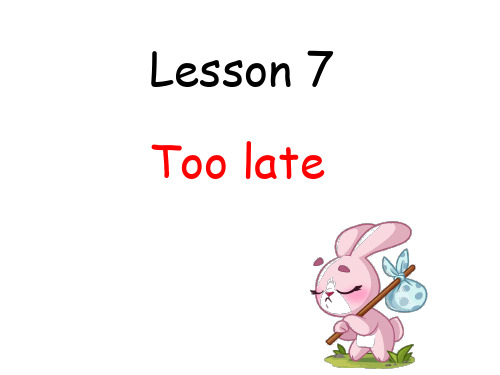
1. detective n. 侦探 一部侦探小说 a detective novel Detective Conan is my favourite cartoon. 名侦探柯南是我最爱的动漫。 侦探们在机场等了整整一上午。
Detectives were waiting at the airport all morning.
(1)当及物动词+副词构成动词短语时,如宾语是代词, 那么只能放在动词和副词之间。
(2)当动词是不及物动词时,需要加介词帮忙,然后 才加宾语,宾语的位置是固定的,及宾语的位置一 定要在介词之后。
look at
看
Come and look at my photograph album. Come and look my photograph album at.
I _e_x_p_e_c_t__ __t_ha_t______I __w_il_l____ ___pa_s_s____ the exam. 我想你已经听到这个消息了。
I expect you’ve heard the news.
4.valuable adj. 贵重的 value +形容词后缀able = valuable MVP: Most Valuable Player 反义词: valueless 没有价值的,无用的 他得到了一些没有价值的新闻。 He got some __v_a_lu_e_le_s_s_____ __ne_w_s________.
5.parcel n. 包裹 一包裹 a parcel of… 一个装着钻石的贵重的包裹
a valuable parcel of diamonds 他们正期待着从南非来的一个装着钻石的贵重包裹。
裕兴新概念英语第二册笔记_第7课_单词讲解

Too late 为时太晚Lesson 77-17-2014New words and expressionsdetective n侦探airport n机场expect v期待,等待valuable adj贵重的parcel n包裹diamond n钻石steal v偷main adj主要的airfield n飞机起落的场地guard n警戒,守卫precious adj珍贵的stone n石子sand n沙子detective n侦探detect1v发现(不好的的事物)察觉,discover/recognize2v侦察,侦查, inverstigate and solov(crime…)eg A machine has been invented to detect gold. 一个机器被发明出来去寻找金子。
eg Many machines have been used to detect the fatal virus. 许多机器被用来探测这种致命的病毒。
eg The wiman employed a private detective to detect her husband. 那个女人雇佣了一名私家侦探来侦查她的丈夫。
detection n发现,查明,查出the detection of a crime破案detector n探测器detectable adj可发现的,可探知的employ a private detective雇佣一名私家侦探a detective novel一部侦探小说a detective story 一个侦探故事airport n机场(民航)at the airport 在机场field n田野airfield n停机坪on the airfield 在停机坪上port n港口,港口城市passport n护照harbour n港湾,避难所Pearl Harbour珍珠港airfield n(小型)飞机场,飞机起落的跑道railway station火车站terminal n(铁路,公路等)终点站tube station地铁站(Br) the under ground railway stationa subway station地铁站 (Am)metro n(尤其指巴黎的)地下铁路n+n 构成一个新的名词handbag手提包water-gate水门water bird水禽(尤其指淡水的)blood test验血silkworm蚕air有关的合成词:airsick晕机的airplane飞机(Am)airraid空袭airtight不透气的air-conditioner n空调expect 1vi预计,预料eg Who has eaten up the cake? I think/expect/supose it was Tom.eg Will you be later? I don`t think/expect/supose so.eg Jim has failed in mathematics as his teacher expected. 正如他老师所预料的那样,吉姆数学考试没及格。
新概念英语第二册课(Lesson7)学习笔记

新概念英语第二册课(Lesson7)学习笔记
Lesson 7 Too late
为时太晚
First listen and then answer the question.
听录音,然后回答以下问题。
Did the detectives save the diamonds?
那些侦探保管好钻石了吗?
The plane was late and detectives were waiting at the airport all morning.
飞机误点了,侦探们在机场等了整整一上午。
They were expecting a valuable parcel of diamonds from South Africa.
他们正期待从南非来的一个装着钻石的贵重包裹。
A few hours earlier, someone had told the police that thieves would try to steal the diamonds.
数小时以前,有人向警方报告,说有人企图偷走这些钻石。
When the plane arrived, some of the detectives were waiting inside the main building while others were waiting on the airfield.
当飞机到达时,一些侦探等候在主楼内,另一些侦探则守候在停机坪上。
新概念英语第二册第7课完整

steal sth. steal sth. from sb. steal 偷钻石 steal the diamonds
vi. 偷偷地行动,悄悄靠近
guard n.警戒,守卫 keep guard body guard life guard guard v. 保卫
站岗
保镖
救生员
precious, valuable, invaluable, valueless priceless, worthless 毫无价值的
有价值的
珍贵的
无价之宝
parcel n. 包裹 a parcel of books The post office lost my parcel. it's awfully annoying.
A place for passengers
ቤተ መጻሕፍቲ ባይዱ
A place for planes
A place for luggage
expect
expect ① vt.&vi. 预计,预料 Jim has passed mathematics as his teacher expected. I didn't expect to find you here. I expect a storm. ② vt. 等待,期待,盼望(心理上的等待) They are expecting guests tonight. He expected her to go with him. I expect you to write back.
when,while 当……时候(强调动作同时发生)
when+延续性动词/瞬间动词
while+从句, 动词一定是延续性动词
新概念第二册Lesson7
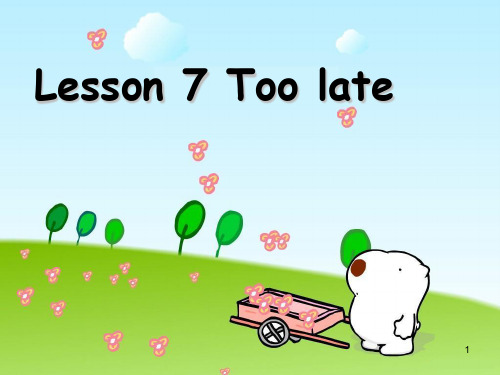
on the airfield 在机场
2. all + 单数n.:构成副词短语
all morning 整整一上午
all day 整整一天
all year 整年
the whole day 一整天 (L3)
17
• When the plane arrived, some of the detectives were waiting inside the main building while others were waiting on the airfield. • While two detectives were keeping guard at the door, two others opened the parcel.
into the bath. 脱掉 3)The plane took off at 8:30 a.m. 起飞
28
Lesson 7 Too late While two detectives were keeping guard at the door, two others opened the parcel. 讲故事: 当Jason还站在雨中的时候,Bruce正在把 Maggie带走。
3. some … others :一些……另一些…… (some+others<1) some …, the others:一些,其余的 (some+the others=1)
18
• While two detectives were keeping guard at the door, two others opened the parcel.
few hours earlier, someone told the police that
新概念英语第二册第七课课文详解
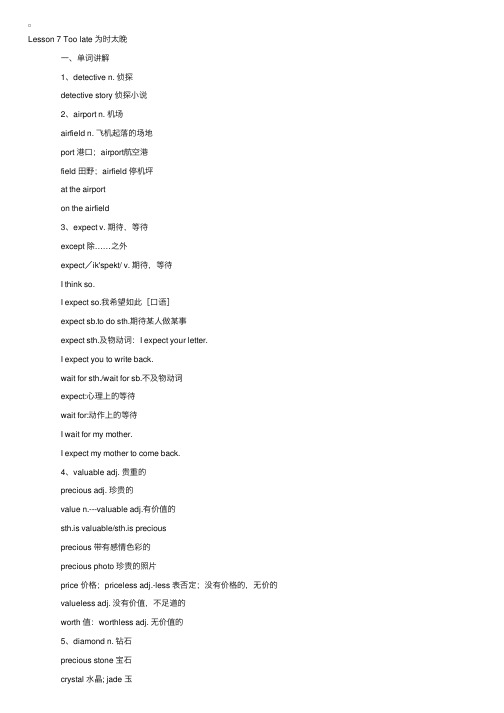
Lesson 7 Too late 为时太晚 ⼀、单词讲解 1、detective n. 侦探 detective story 侦探⼩说 2、airport n. 机场 airfield n. 飞机起落的场地 port 港⼝;airport航空港 field ⽥野;airfield 停机坪 at the airport on the airfield 3、expect v. 期待,等待 except 除……之外 expect/ik'spekt/ v. 期待,等待 I think so. I expect so.我希望如此[⼝语] expect sb.to do sth.期待某⼈做某事 expect sth.及物动词:I expect your letter. I expect you to write back. wait for sth./wait for sb.不及物动词 expect:⼼理上的等待 wait for:动作上的等待 I wait for my mother. I expect my mother to come back. 4、valuable adj. 贵重的 precious adj. 珍贵的 value n.---valuable adj.有价值的 sth.is valuable/sth.is precious precious 带有感情⾊彩的 precious photo 珍贵的照⽚ price 价格;priceless adj.-less 表否定;没有价格的,⽆价的 valueless adj. 没有价值,不⾜道的 worth 值:worthless adj. ⽆价值的 5、diamond n. 钻⽯ precious stone 宝⽯ crystal ⽔晶; jade ⽟ diamond ring 钻⽯戒指 6、steal v. 偷 steal,stole,stolen steal sth. 偷(某物) rob sb. 抢(某⼈) My wallet was stolen. I was robbed. rob the bank 7、main adj. 主要的 main building; main street main sentence; main idea 不与⼈连⽤ 8、guard n. 警戒,守卫 life guard 救⽣员/body guard 保镖 ⼆、语法重点--宾语 1、v.+prep.介词+宾语 come and look at... I am looking for... 2、 v.+prep. 介词/adv.代表不同的意思 look at 看;look after照料 3、v.+prep./adv.+宾语(n.) v.+宾语(n./pron.)+prep./adv. take off the coat……take the coat off/take it off coat n.作宾语 put on your shoes/put your shoes on/put them on 笔记: 宾语的位置和词性取决于施加动作的动词(在乐加乐学过新⼆的孩⼦应该知道宾语的构成和位⼦) 介词出现,⼀定要有宾语,所以 v.+prep.+宾语(n.) 副词可省略.v.+宾语(n./pron.)+adv. 或 v.+adv.+宾语(n.) at,after prep; off adv. vt.+宾语 vi.+prep.+宾语 take vt./look vi. I always take money with me. 附上及物动词和不及物动词讲解: A 有些动词只是及物动词; 它们不可以单独⽤,后⾯必须跟宾语。
新概念英语第二册 Lesson7 a famous clock 课件

This clock, which has rarely gone wrong,can be heard on the B.B.C. when it is striking, because microphones are connected to the clock tower.
Lesson 71 A famous clock
will soon find it.
2. You will be very lucky if he lets you go without a ticket.
8.Big Ben has rarely gone wrong. 9.Once, however, it failed to give the correct time. 10.A painter who had been working on the tower hung a pot of paint on one of the hands and slowed it down!
check n/v. 检查 n.支票
• check in 登记
• He has just checked in at the hotel. 他刚刚在旅馆办好住宿手续。
新概念第二册Lesson73课件

From there, he hitchhiked to Paris in a lorry. The driver gave him a few biscuits and a cup of coffee and left him just outside the city. The next car the boy stopped did not take him into the center of Paris as he hoped it would, but to Perpignan on the French-Spanish border. There he was picked up by a policeman and sent back to England by the local authorities. He has surely set up a record for the thousands of children who dream of evading school. (182 words)
3. imaginable 能够想象出的 常作后置定语 This is the worst result
imaginable.
evade
v. 逃避; 回避 If you try to evade
paying your taxes you risk going to prison.
tax avoidance 合理避税 (合法)
From there, he hitchhiked to Paris in a lorry. The driver gave him a few biscuits and a cup of coffee and left him just outside the city. The next car the boy stopped did not take him into the center of Paris as he hoped it would, but to Perpignan on the French-Spanish border. There he was picked up by a policeman and sent back to England by the local authorities. He has surely set up a record for the thousands of children who dream of evading school. (182 words)
新概念第二册第七课完整课件

• Expect v. 期待, 等待 • ① 预计,预料
• 正如他老师所预料的那样,吉姆数学考试没及格。 • Jim has failed in mathematics as his teacher expected.
• ② 等待,期待,盼望(心理上的等待)
• 今晚有人要去他们那里作客。 • They are expecting guests tonight.
• 一般过去将来时表示从过去的某一时间来看将来 要发生的动作或呈现的状态。一般过去将来时的 出发点是过去,即从过去某一时刻看以后要发生 的动作或状态。
• 他说他要来看我。 • He said he would come to see me.
. 13
• steal-stole-stolen • ① 偷盗,行窃
• 英语中“偷”用steal和rob 来表达。宾语是物,用 steal;宾语是人,用rob ;跟地点相连,也用rob.
• steal sth. 偷(某物) • My wallet was stolen. • rob sb. 抢(某人) • I was robbed.
. 14
• ② 巧妙地占用, 偷偷地弄到手
• wait for sth./sb. 动作上的等待
• I wait for my mother.
. 8
• valuable adj. 贵重的 (有价值的)
• A valuable painting
• precious adj. 珍贵的 (带有感情色彩)
• A precious photo
➢invaluable & valueless
Lesson 7
Too late
.
1
.
新概念第二册7课课文

新概念第二册7课课文新概念第二册7课课文最近有留意到一些小伙伴在在查找有关新概念第二册7课课文,所以小编今天就为大家准备了,请看下面的内容。
新概念第二册7课课文原文:Lesson 7 Too late为时太晚The plane was late and detectives were waiting at the airport all morning.They were expecting a valuable parcel of diamonds from South Africa.A few hours earlier,someone had told the police that thieves would try to steal the diamonds.When the plane arrived,some of the detectives were waiting inside the main building while others were waiting on the airfield.Two men took the parcel off the plane and carried it into the Customs House.While two detectives were keeping guard at the door,two others opened the parcel.To their surprise,the precious parcel was full of stones and sand!参考译文飞机误点了,侦探们在机场等了整整一上午.他们正期待从南非来的一个装着钻石的贵重包裹.数小时以前,有人向警方报告,说有人企图偷走这些钻石.当飞机到达时,一些侦探等候在主楼内,另一些侦探则守候在停机坪上.有两个人把包裹拿下飞机,进了海关.这时两个侦探把住门口,另外两个侦探打开了包裹.令他们吃惊的是,那珍贵的包裹里面装的全是石头和沙子!新概念第二册7课课文解析:1.…detectives were waiting at the airport all morning. ……侦探们在机场等了整整一上午。
新概念英语第二册第七课课文

新概念英语第二册第七课课文全文共3篇示例,供读者参考篇1A Working DayYo wassup guys! Today I'm gonna give y'all the lowdown on this reading we did in class about a dude named Eric Walker's typical work day. At first it sounds like a total snoozefest, but trust me, this one's got some twists and turns that'll keep you on your toes!So it starts off with Eric waking up at 7 am to the sound of the radio blaring some tunes. Seems pretty standard so far, right? But get this - he leaves the radio on while he showers and gets ready! I can barely function without my morning playlist, but having an actual radio going while I'm trying to wake up sounds like a one-way ticket to Headache City.Anyway, after his sonic shower routine, he heads downstairs for a classic English brekky - eggs, bacon, toast and coffee. Again, nothing too crazy here. Buttttt then it takes a turn for the weird - Eric straight up reads his morning paper WHILE shoveling food into his mouth! How's my dude not choking or spilling crumbsand coffee all over those pristine newspaper pages? That's some serious multi-tasking skills right there.Once he's refueled, it's off to the office for Eric. But not before throwing on his suit and tie - talk about a blast from the past! I can count on one hand the number of times I've had to wear a full suit, and I'm sure most of you guys are the same. We're talking slacks, shirt, jacket, the whole nine yards. I'm sweating just thinking about having to get all dressed up like that for the daily grind.Eric's commute is pretty tame - he hops in his car and fights through the usual morning traffic. Sounds exactly like what my parents deal with on their way to work. No hoverboards or teleportation devices in sight. How retro!When he finally makes it to the office, Eric starts off by sorting through the mail and checking over any urgent documents. Mail? Like...physical letters and packages? What is this, the 1800s? I handle 99.9% of my communication digitally nowadays. Having to rifle through piles of paper mail sounds like such a hassle.After that riveting mail check, Eric spends a couple hours typing away at reports and memos on his computer. Okay, now we're finally in the 20th century! He took shorthand notes duringsome meetings too - I had to look that up, and it's basically super fast handwritten note-taking with a bunch of symbols and abbreviations. Sorry Eric, but we've got way more efficient technology for that these days. No more cramped up hands from furious pencil-scribbling required!At noon, Eric takes his lunch break. And you'll never guess what he does...he heads to the staff canteen and buys a salad! Cue the gasps of shock and horror! A salad?? For lunch Who does this madman think he is? Just thinking about eating a sad little pile of leaves and veggies in the middle of the day is making me lose my appetite. Where's the burgers? The pizza? The snack cakes from the vending machine? This is an outrage!Post-Sadness Salad, Eric spends the rest of the afternoon making phone calls, going to more meetings, and typing up more documents. I'm getting majorly bored just hearing about this stuff. Apparently he finally leaves around 5:30 pm - so much for that elusive "work-life balance" we're always being told about these days!The journey home is just as thrilling as the morning commute. Except this time, Eric swings by the grocery store on the way to grab some stuff for dinner. Let me get this straight - dDude went to the actual grocery store...after working a full dayat the office?I'm tired just from listening to this saga! Why didn't he just tap a couple buttons and have everything delivered right to his doorstep?Finally - FINALLY - Eric gets home around 6:30 pm. After being a corporate robot all day, you'd think the man would kick back and demolish a family-sized bag of chips while watching TVor something. But noooo, not Eric Walker! This absolute madman starts cooking an entire meal from scratch. We're talking veggies, meat, pots and pans - the full home-cooked experience!I don't know about you, but after a long day of classes and extracurriculars, the LAST thing I want to do is play Master Chef in the kitchen. My typical evening consists of nuking a frozen meal or ordering some delivery, not this kind of from-scratch cooking insanity!To be honest, I'm getting total Dorothy vibes from this mundane schedule: "...and you were there, and you were there..." Because by 9 pm, Eric has cleaned up after dinner, done some laundry, read a few chapters of a book, watched a bit of TV, and gotten ready for bed. How thrilling.I mean, I give Eric props for being so dutiful and responsible. But sheesh, talk about a total snoozefest of a day! No wonderthat new vidgame or social media app is always looking way more appealing than my homework. If having a "working day" means doing absolutely nothing out of the ordinary besides...working...then you can count me out.Give me something exiting! Give me adventure! A life filled with spontaneous road trips, viral videos to post, the latest tech to obsess over. Anything but Salad Man's oppressively normal routine. Thanks for coming to my TED Talk, fam!篇2An Eye-Opening Lesson on Appearance and RealityAs an eager student striving to improve my English proficiency, I found Lesson 7 from New Concept English Book 2 to be a truly thought-provoking experience. The passage delves into the intricate relationship between appearance and reality, challenging our preconceived notions and compelling us to question the very nature of our perceptions.The lesson begins with a seemingly innocuous conversation between two individuals, Tom and Jim, discussing a peculiar advertisement they stumbled upon in a newspaper. The advertisement, which promised a "priceless" experience for a mere fifty cents, piqued their curiosity, and they decided toinvestigate further. Little did they know that this decision would lead them on a journey of self-discovery and a profound understanding of the dichotomy between what we see and what truly lies beneath the surface.As Tom and Jim ventured to the address provided in the advertisement, they encountered a dilapidated building that hardly exuded the promise of a "priceless" experience. However, their skepticism was soon replaced by intrigue as they were guided through a series of rooms, each more perplexing than the last. The stark contrast between the outward appearance of the building and the captivating experiences within served as a potent metaphor for the central theme of the lesson.One of the most striking moments in the passage was the description of the room adorned with mirrors, where Tom and Jim found themselves surrounded by countless reflections of themselves. This experience forced them to confront their own perceptions of themselves and the world around them, challenging the very notion of what constitutes reality. The mirrors, symbolic of self-reflection and introspection, became a powerful tool for exploring the depths of human experience and understanding.As the passage progressed, Tom and Jim encountered a series of optical illusions and mind-bending exhibits that defied their expectations and challenged their senses. From distorted perspectives to impossible shapes, each room presented a new puzzle for them to unravel, forcing them to question the reliability of their own perceptions.The culmination of their journey was the final room, where they witnessed a breathtaking display of light and sound, a true spectacle that transcended the boundaries of what they had previously deemed possible. This experience served as a poignant reminder that reality often extends far beyond our limited understanding, and that the true essence of life lies in embracing the unknown and embracing the mysteries that surround us.Throughout the passage, the author skillfully weaves a narrative that seamlessly blends philosophical musings with engaging storytelling. The dialogue between Tom and Jim is not only entertaining but also serves as a vehicle for conveying profound insights into the human condition. Their reactions, ranging from bewilderment to awe, mirror the very journey that each reader embarks upon as they navigate the depths of this thought-provoking lesson.Ultimately, Lesson 7 from New Concept English Book 2 is a testament to the power of language and literature to transcend mere linguistic boundaries and delve into the very essence of what it means to be human. It challenges us to question our assumptions, to embrace the unknown, and to recognize that the true richness of life lies in the journey itself, not in the destinations we seek.As a student, this lesson has left an indelible mark on my understanding of the English language and the profound insights that can be conveyed through its mastery. It has inspired me to approach language not merely as a tool for communication but as a gateway to self-discovery and a deeper appreciation of the complexities that lie beneath the surface of our daily experiences.In conclusion, Lesson 7 from New Concept English Book 2 is a brilliant tapestry of storytelling, philosophy, and linguistic mastery, woven together to create a captivating and enlightening experience. It is a reminder that true knowledge extends far beyond the confines of textbooks and classrooms, and that the journey of learning is a lifelong pursuit that requires an open mind, a curious spirit, and a willingness to challenge our preconceived notions of reality.篇3Wow, Lesson 7 was a really intense one! The reading passage was all about the famous British explorer George Mallory and his attempts to climb Mount Everest back in the 1920s. I have to admit, before this lesson I didn't know much about Mallory or the early expeditions to scale the world's highest peak. But this text gave a really fascinating glimpse into that era of adventuring and mountain climbing.The passage starts by setting the scene - describing Mallory as ambitious and determined to be the first to reach the summit of Everest. It mentions how climbing the mountain had become almost an obsession for him after his first attempt in 1921. I can only imagine how driven and single-minded you'd have to be to keep trying to achieve something so incredibly difficult and dangerous, year after year.The narration then goes into some really vivid details about the 1924 expedition that Mallory took part in. I started feeling tense just reading about the grueling journey across the glaciers, climbing through deep snow, and having to hack out steps in the ice. The conditions they faced seemed brutally harsh - things like being blasted by -40C winds, having tents ripped apart, andrunning desperately low on supplies. It's hard to fathom dealing with that sort of extreme environment.What struck me most though was the climbing equipment and gear they had back then. In one part it describes them climbing while "pulling themselves up by leather ropes" and using tools like ice axes and crampons that sound medieval compared to today's high-tech mountaineering gear. Can you imagine trying to scale Everest's icy slopes in hiking boots tied to crude crampon spikes? Just the thought makes my feet go numb!The passage also doesn't shy away from the mortal dangers involved. It starkly states that seven climbers had already died on Everest before Mallory's attempts, which must have weighed heavily on their minds. And then the ominous final line about Mallory and his climbing partner being spotted for the last time only 800 feet from the summit before disappearing, leaving their fate unknown for decades. Chilling stuff.After learning about Mallory's struggles and the heroic spirit of those early Everest pioneers, I have so much more appreciation for what modern climbers go through at extreme altitudes. The passage said that above 25,000 feet, the lack of oxygen made even simple tasks like lighting a stove or tying ashoelace monumentally difficult. And Mallory's team had to climb without bottled oxygen or any of the specialized equipment we take for granted today. Just getting to the higher camps alone must have pushed their physical and mental limits.I'm also amazed by the sheer determination and acceptance of risk those early explorers embraced. As the reading states, when Mallory was asked why he wanted to climb Everest, he gave that famous quote: "Because it's there." A refreshingly simple answer that speaks volumes about the human drive to test our boundaries and achieve the seemingly impossible, regardless of the dangers.After reading this gripping tale, I feel inspired to learn more about Mallory, his ill-fated partner Sandy Irvine, and the other unsung adventurers who blazed the trail in Himalayan mountaineering. While their story didn't have a storybook ending, they embodied a bold pioneering spirit that made future expeditions possible. I have a newfound respect for the audacious dream chasers and frontier pushers of that era.I also couldn't help pondering what thoughts must have raced through Mallory's mind on that final push to the summit, knowing his wife and children were potentially watching him through a telescope back at base camp. Did he realize howfamous and mythologized his story would become? Or was he just utterly focused on overcoming that ultimate test of human endurance? The mystique surrounding his final hours will forever make him an enigmatic cult figure in the annals of exploration.In the end, while the passage doesn't flinch from depicting the grave risks of high-altitude alpinism, it left me feeling strangely inspired rather than discouraged. There's something remarkably vivid and life-affirming about people pushing themselves to the absolute brink of their physical capacities - all out of an innate yearning to discover, to achieve something monumental, or simply answer the human calling to adventure.Mallory's journey was one of grit, suffering, and unfortunately tragedy. But stories like his force us to re-evaluate the comfort zones we settle into and consider what unconquered summits still await the intrepid climbers of today. This lesson has me daydreaming about my own Everest - what's that one extraordinary, impossible-seeming life pursuit I could dedicate myself to, even if it pushes me to the limits? Mallory's legacy will endure as a testament to transcendent human resolve in the face of overwhelming adversity. Not a bad lesson to digest alongside grammar rules and vocab lists.。
新概念英语第二册课第七课后习题答案详解Lesson

新概念英语第二册第七课课后习题答案详解Lesson 7 1.B 根据课文第3-4行someone had told the police that thieves would try to stealthe diamond 和第8-9行While two detectives were keeping guard at thedoor …可以判断出b. to prevent a robbery 是正确答案,其他3个都不对。
个都不对。
2. C 根据课文最后一句话根据课文最后一句话To their surprise, the precious parcel was full of stonesand sand! 可以推测出c. didn ’t prevent the robbery 是正确的答案。
其他3个选择都不符合课文内容。
3. C 从回答中可以看出,此问句是对地点发问的, a. Why, b. When, d. What 都不能针对地点提问,都不能针对地点提问,只有只有c. Where 是问地点的,可以用At the airport 来回答,所以选c. 4. D 这一句是针对动词宾语提问的,回答是用名词短语A valuable parcel of diamonds . a. Why, b. When , C. where 这几个疑问词都不能针对动词宾语(名词)提问的,只有d. What 可以对名词可以对名词提问。
提问。
5. A 前面句子是过去完成时(hadtold ),表示在过去某一动作或情况发生之前完成的事情,“某人告诉警察。
”这一事件一定是在“飞机到达之前”发生的。
所以正确答案选a. before(在……之前在……之前) 6. C a. in 后面需要有一个表示地点的名词,意思才完整;b. into 在意思上讲不通;d. for 后面需要有一个名词做宾语,意思才完整;只有c. inside(在里面在里面)意思最完整,而且与前半句的动作went into the building相符合,所以选相符合,所以选c. 7. D 4个选择中只有d. took it off 最符合题目意思和语法,所以选d. 8. A b. waiting 是不及物动词,后面不能直接跟名词;c. expecting for 中的expect是及物动词,后面不能加for; d. expecting to 中expect后面不能加to; 只有a. expecting最符合语法。
新概念英语第二册语法精讲-Lesson7
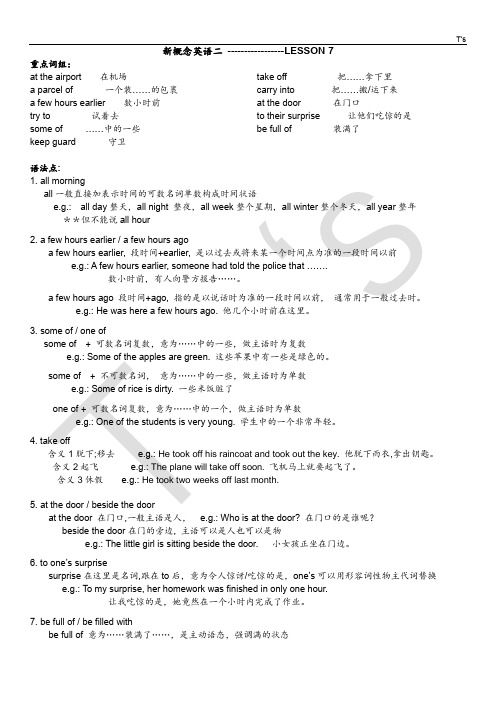
新概念英语二-----------------LESSON 7重点词组:at the airport 在机场a parcel of 一个装……的包裹a few hours earlier 数小时前try to 试着去some of ……中的一些keep guard 守卫take off 把……拿下里carry into 把……搬/运下来at the door 在门口to their surprise 让他们吃惊的是be full of 装满了语法点:1. all morningall一般直接加表示时间的可数名词单数构成时间状语e.g.: all day整天,all night 整夜,all week整个星期,all winter整个冬天,all year整年**但不能说all hour2. a few hours earlier / a few hours agoa few hours earlier, 段时间+earlier, 是以过去或将来某一个时间点为准的一段时间以前e.g.: A few hours earlier, someone had told the police that …….数小时前,有人向警方报告……。
a few hours ago 段时间+ago, 指的是以说话时为准的一段时间以前,通常用于一般过去时。
e.g.: He was here a few hours ago. 他几个小时前在这里。
3. some of / one ofsome of + 可数名词复数,意为……中的一些,做主语时为复数e.g.: Some of the apples are green. 这些苹果中有一些是绿色的。
some of + 不可数名词,意为……中的一些,做主语时为单数e.g.:Some of rice is dirty. 一些米饭脏了one of + 可数名词复数,意为……中的一个,做主语时为单数e.g.: One of the students is very young. 学生中的一个非常年轻。
新概念第二册lesson73课文

新概念第二册lesson73课文在新概念英语第二册的第73课中,我们学习了一篇名为“The car crash” 的文章。
这篇文章讲述了一个车祸发生后的情况,描绘了事故的惨痛和悲伤,同时也给读者带来了一些思考。
在这篇文章中,作者通过简洁而深刻的语言,让我们对生活中的意外事件有了新的认识和思考。
下面,我将以不同角度来解读这篇文章,希望能为大家带来一些新的启发和思考。
让我们来看看文章中所描绘的车祸场景。
在文章中,作者用生动的语言描述了车祸现场的情况,如碎裂的玻璃、扭曲的车身和流出的油漆。
这种细腻的描绘让读者仿佛亲临现场,感受到了事故带来的惨痛和痛苦。
而在这种描写中,我们也不难发现作者对于生命的珍贵和脆弱的思考。
生活中的意外事件时刻都可能发生,我们应当更加珍惜眼前的一切,更加满怀希望和勇气地面对生活。
文章也提到了事故后人们的反应。
在文章中,作者写道“人们不断地走过那条街,但连一个人也没有停下来”。
这种冷漠无情让人触目惊心,让我们思考人与人之间的关系以及责任。
在现实生活中,我们也常常会遇到类似的情况,有人需要帮助,却没有人愿意伸出援手。
这篇文章通过真实的描写让我们思考人性的善良和冷漠,以及社会责任感的重要性。
文章还提到了对于未来的展望。
在文章结尾处,作者写道“一切又回到了原状,只是在这条街上多了一个黑色的标记”。
这种对于未来的紧迫感让人深感不安,也让我们思考未来的走向。
在这个瞬息万变的世界里,我们应该如何面对未知、如何规划好自己的未来,这些都是我们需要思考的问题。
这篇文章以简洁而深刻的语言,描绘了一幅意外事件后的画面,引发了我们对生命、人性和未来的思考。
在现实生活中,我们也时常会遇到各种挑战和困难,但是我们应该学会珍惜每一刻,善良待人,同时也要有勇气和希望地面对未来。
这种对待生活的态度和思考,也是这篇文章所希望给读者的启发和思考。
在阅读完这篇文章后,我深有感触。
我认为我们应该更加珍惜眼前的一切,坦然面对生活中的挑战,并且时刻准备着迎接未来的到来。
新概念第二册lesson73课文
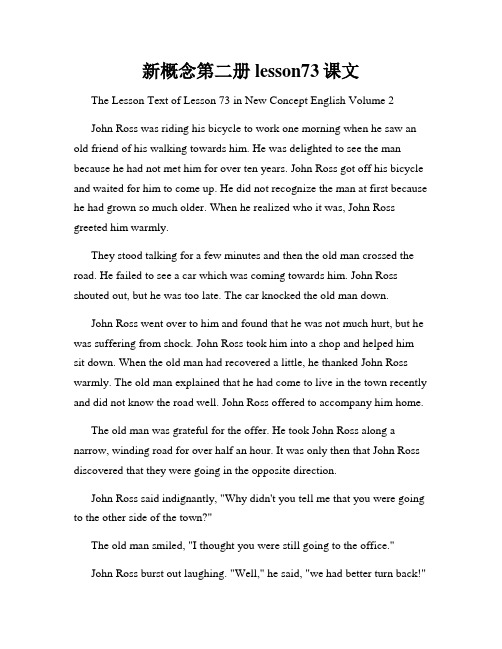
新概念第二册lesson73课文The Lesson Text of Lesson 73 in New Concept English Volume 2John Ross was riding his bicycle to work one morning when he saw an old friend of his walking towards him. He was delighted to see the man because he had not met him for over ten years. John Ross got off his bicycle and waited for him to come up. He did not recognize the man at first because he had grown so much older. When he realized who it was, John Ross greeted him warmly.They stood talking for a few minutes and then the old man crossed the road. He failed to see a car which was coming towards him. John Ross shouted out, but he was too late. The car knocked the old man down.John Ross went over to him and found that he was not much hurt, but he was suffering from shock. John Ross took him into a shop and helped him sit down. When the old man had recovered a little, he thanked John Ross warmly. The old man explained that he had come to live in the town recently and did not know the road well. John Ross offered to accompany him home.The old man was grateful for the offer. He took John Ross along a narrow, winding road for over half an hour. It was only then that John Ross discovered that they were going in the opposite direction.John Ross said indignantly, "Why didn't you tell me that you were going to the other side of the town?"The old man smiled, "I thought you were still going to the office."John Ross burst out laughing. "Well," he said, "we had better turn back!"The two men walked back to the town, but by the time they had reached it, John Ross realized that it was too late for him to go to the office. He took the old man to a cafe instead and they had lunch together.John Ross went back to work happily in the afternoon, for he realizedthat friendship was more valuable than time.总结这篇文章讲述了约翰·罗斯(John Ross)早上骑自行车上班的时候,遇见了自己的老朋友。
《新概念英语》第二册第7课

Lesson 71, The plane was late and detectives were waiting at the airport all morning.1) late:可用作形容词和副词。
<1>、形容词“迟的,晚的”Yon are late again,don’t be late next time.你又迟到了,下次别这样。
The train was ten minutes late because of the bad weather.因为天气不好,火车晚点了10钟。
The accident happened in the late afternoon.这事故发生在傍晚(下午五、六点钟)。
late作形容词时还有“前⋯⋯、已故的⋯⋯、最近的、最新的”之意。
如:The film is about the late Premier Zhou Enlai.这部影片是写已故总理周恩来的。
Some late news of the war has just come in.一些最近的战争消息刚到。
这时,late的意思和latest的意思相同。
<2>.用作副词,意为“晚、到很晚”。
例如:The workers in the south often go to work early and leave off late.南下打工仔经常是早上工,晚下班。
work late / far / deep into the night 工作至深夜2) detectiveadj. 侦探的n. 侦探<1>. The company hired a detective to investigate the accident.公司雇佣了一名侦探来调查这次事故。
<2>. I could now see what the detective was driving at: he was trying to establish my whereabouts on the night of the crime. 我现在能够明白侦探的意思了:他那时正试图确定案发那天夜晚我的行踪。
- 1、下载文档前请自行甄别文档内容的完整性,平台不提供额外的编辑、内容补充、找答案等附加服务。
- 2、"仅部分预览"的文档,不可在线预览部分如存在完整性等问题,可反馈申请退款(可完整预览的文档不适用该条件!)。
- 3、如文档侵犯您的权益,请联系客服反馈,我们会尽快为您处理(人工客服工作时间:9:00-18:30)。
4.There he was picked up by a policeman and sent back to England by the local authorities. ① Pick up (1)拾起,拿起 • Pick up a coin in the road • Pick up the telephone (2)搭载乘客,驾车去接人 Shall I pick you up at the station? 我去车站接你吧 (3)恢复,使恢复,变好(常描述健康,景气,时态等恢复, 变好)I believe things will pick up soon ②sent back to 送回去 the local authorities. 地方当局 the school authorities. 学校当局 the authorities concerned 有关当局
2.truant n.
※ play truant (Br.) 逃学 ※ play hooky (Am.)= evade school
3. unimaginative adj. 缺乏想象力的 1) imaginative [i'mæ dʒinətiv] adj. 有想象力的 2) imagine v. 想象 imagine doing sth. 想象做某事 3) imaginary [i'mæ dʒinəri] adj. 想象中的,不真实的, 假想的 4) imaginable [i'mæ dʒinəbl] adj.可想象的 5) imagination[i,mæ dʒi'neiʃən] n. 想象力,想象的事物 6) image['imidʒ] n. 肖像,形象,比喻
7. lorry 卡车(lorries pl.) truck 载货卡车(美) 8. border 1) n. 边界,国界 the French-Spanish border 法国和西班牙的边界 border land 边疆 border line 国境线 近义词: (1) boundary['baundəri] n.界限,分界线 (2) limit 界限,极限 (3) edge 边缘 (4) margin 空白边缘,页边空白 (5) outline 轮廓,外形 2) n. 边,缘,边沿,(衣服的)滚边 eg. The handkerchief has a lace border. 那手帕有蕾丝花边。 3) v. 和…接壤,(土地)毗邻 French borders (on) Germany.
4. shame n. 1) n. (u) 惭愧,羞耻 put sb. to shame 使…感到惭愧;使…黯然失色;大大优于某人 eg. Cinderella’s beauty put her sister to shame. bring shame on sb. 使…蒙羞 2) n. (c) 遗憾的事,可惜 What a shame!/ What a pity! 多遗憾呀! 3) n. (c) 耻辱,可耻之事 eg. He was called a shame to their school. 他被称着学校之耻。 Shame! 可耻 Shame on you! 真丢人。 to one’s shame 令某人感到羞耻的是 eg. To my shame, I made a mistake again.
3、The next car the boy stopped did not take him into the centre of Paris as he hoped it would, but to Perpignan on the French-Spanish border. • as sb. hope / expect 正如某人所希望的 • Eg: I became a good teacher as my mother hoped. • than sb hope /expect 超过某人所希望的 • the French-Spanish border 法国与西班牙的边界 (边 界地带属于哪个地方由第一个国籍确定) • not … but…不是 …而是 … • My fellow Americans, ask not what your country ca for your country .
2. No one noticed the boy as he crept off. ①notice: 注意到某人做了某事:notice sb do sth 注意到某人正在做某事:notice sb doing sth attract notice=draw notice 引人注目 Wait until further notice 等待进一步通知 张贴一张告示 put up a notice bring sth to one's notice 使某人看见,注意到 notice bard 布告栏=Bulletin board (美) ② creep off 爬出来 Creep into 悄悄混进去,爬进去 creep upon=creep over 悄悄的来到,不知不觉到来 Eg:Age crept upon him 他感觉老年悄悄来到 Creep 四足动物爬行 Crawl 动物以腹部爬行
9.★evade v. 逃避,逃离 ① vt.(巧妙地)逃脱,躲开 She evaded a blow from the man and then called out for help. ② vt. 回避,逃避(尤指不当地) evade doing sth. 逃避做…… He always tries to evade paying taxes. Many children dream of evading school. 辨析:avoid 指通过一种合理的,正当的手段来避免做某事; evade 指通过欺骗的手段来避免做某事。 • avoid tax 避税 • evade tax 逃税 who was put into prison for evading tax?
• 相关词: 1) shameful adj. 可耻的,丢脸的 a shameful conduct 可耻的行为 2) shameless adj. 厚颜无耻的,不要脸的 a shameless cheat 厚颜无耻的骗子 a shameless liar 厚颜无耻说谎的人 3) shamefully adv. 可耻地,丢脸地 4) shamelessly adv. 厚颜无耻地,不要脸地
5. hitchhike v. 搭便车旅行 (hitch) 1) hitch v. 搭便车 eg. Can I hitch a lift to Paris? 我能搭个便车去巴黎吗? ask for a lift / get a free ride 搭便车 give sb. a lift 让某人搭车 2) hike n./v. 远足,徒步旅行 3) hitchhiker n. 搭车者 6. meantime 1) n. 其间 in the meantime 在此期间,与此同时 eg. In the meantime, the lorry traveled 1600 miles. 2) adv. (meanwhile) 期间,同时 eg. I continued watching TV. Meanwhile, I knitted my new sweater out of wool. 我继续看电视,同时我在织一件新 毛衣。
Lesson 73 The record-holder
单词
1.record-holder n. record-breaker n.
• ※set
up/ build up / make / create a record • ※ hold a record break/ beat a record • smash a record 大破记录
课文
1. A quiet day's fishing, or eight hours in a cinema seeing the same film over and over again, is usually as far as they get. (1)动词ing前面如果出现定语,若是名词,则采用名词所有格或 名词短语本身。 eight hours' seeing the film • 非谓语动词做主语,一律作单数看。 • Three hours in the room,It is tiring. • Three hours(') listening to the teacher is tiring. • Three hours in the room listening to the teacher is tiring. (2)over and over again = again and again 一次又一次,一再地,反复许多次地 (3)as far as +从句 最大程度……,到……程度, As far as I know , … 就我所知 As far as I am concerned,…就我而言(表示个人观点看法)
